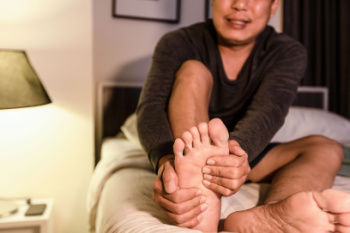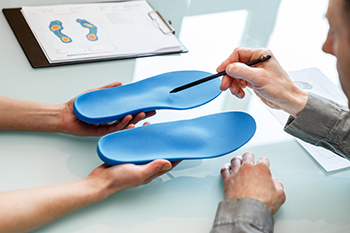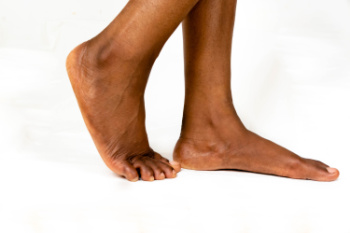Connect With Us
Blog
 Diabetes can lead to a condition known as neuropathy, a type of nerve damage that often affects the legs and feet, due to high blood sugar levels over time. High blood sugar can harm the tiny blood vessels that supply nerves, especially those in the lower extremities. This can cause symptoms ranging from tingling, numbness, and pain in the feet to more severe issues like loss of sensation. The loss of feeling is particularly concerning because it can make it difficult for someone to notice injuries or infections. This, in turn, heightens the risk of serious complications, such as foot ulcers and infections that heal poorly. Managing blood sugar levels is important for preventing or slowing the progression of neuropathy. If you are at risk for neuropathy and wound care issues, it is suggested that you have regular check-ups with a podiatrist to monitor foot health and prevent complications.
Diabetes can lead to a condition known as neuropathy, a type of nerve damage that often affects the legs and feet, due to high blood sugar levels over time. High blood sugar can harm the tiny blood vessels that supply nerves, especially those in the lower extremities. This can cause symptoms ranging from tingling, numbness, and pain in the feet to more severe issues like loss of sensation. The loss of feeling is particularly concerning because it can make it difficult for someone to notice injuries or infections. This, in turn, heightens the risk of serious complications, such as foot ulcers and infections that heal poorly. Managing blood sugar levels is important for preventing or slowing the progression of neuropathy. If you are at risk for neuropathy and wound care issues, it is suggested that you have regular check-ups with a podiatrist to monitor foot health and prevent complications.
Neuropathy
Neuropathy can be a potentially serious condition, especially if it is left undiagnosed. If you have any concerns that you may be experiencing nerve loss in your feet, consult with Steven Black, DPM from California . Our doctor will assess your condition and provide you with quality foot and ankle treatment for neuropathy.
What Is Neuropathy?
Neuropathy is a condition that leads to damage to the nerves in the body. Peripheral neuropathy, or neuropathy that affects your peripheral nervous system, usually occurs in the feet. Neuropathy can be triggered by a number of different causes. Such causes include diabetes, infections, cancers, disorders, and toxic substances.
Symptoms of Neuropathy Include:
- Numbness
- Sensation loss
- Prickling and tingling sensations
- Throbbing, freezing, burning pains
- Muscle weakness
Those with diabetes are at serious risk due to being unable to feel an ulcer on their feet. Diabetics usually also suffer from poor blood circulation. This can lead to the wound not healing, infections occurring, and the limb may have to be amputated.
Treatment
To treat neuropathy in the foot, podiatrists will first diagnose the cause of the neuropathy. Figuring out the underlying cause of the neuropathy will allow the podiatrist to prescribe the best treatment, whether it be caused by diabetes, toxic substance exposure, infection, etc. If the nerve has not died, then it’s possible that sensation may be able to return to the foot.
Pain medication may be issued for pain. Electrical nerve stimulation can be used to stimulate nerves. If the neuropathy is caused from pressure on the nerves, then surgery may be necessary.
If you have any questions, please feel free to contact our office located in Lancaster, CA . We offer the newest diagnostic and treatment technologies for all your foot care needs.

Orthotics, specialized shoe inserts designed to support and align the foot and ankle, are crafted by a myriad of companies worldwide. However, amidst this diversity, podiatrists stand out as experts in the field. These healthcare professionals possess extensive knowledge of foot anatomy, biomechanics, and gait analysis, enabling them to tailor orthotic solutions to individual needs effectively. Unlike mass-produced inserts, podiatrists meticulously assess each patient's unique requirements, accounting for factors like foot structure, medical history, and lifestyle. This personalized approach ensures optimal fit and function, addressing a wide range of conditions, from plantar fasciitis to diabetic foot complications. Podiatrists employ a variety of techniques and materials, including foam impressions, computerized scans, and custom molds to create orthotics that provide maximum comfort and support. Furthermore, they offer ongoing care and adjustments, ensuring patients experience lasting relief and improved mobility. If you experience foot or ankle discomfort, it is suggested that you schedule an appointment with a podiatrist to discuss whether custom-made orthotics can help you.
If you are having discomfort in your feet and would like to try orthotics, contact Steven Black, DPM from California . Our doctor can provide the care you need to keep you pain-free and on your feet.
What Are Orthotics?
Orthotics are inserts you can place into your shoes to help with a variety of foot problems such as flat feet or foot pain. Orthotics provide relief and comfort for minor foot and heel pain but can’t correct serious biomechanical problems in your feet.
Over-the-Counter Inserts
Orthotics come in a wide variety of over-the-counter inserts that are used to treat foot pain, heel pain, and minor problems. For example, arch supports can be inserted into your shoes to help correct overarched or flat feet, while gel insoles are often used because they provide comfort and relief from foot and heel pain by alleviating pressure.
Prescription Orthotics
If over-the-counter inserts don’t work for you or if you have a more severe foot concern, it is possible to have your podiatrist prescribe custom orthotics. These high-quality inserts are designed to treat problems such as abnormal motion, plantar fasciitis, and severe forms of heel pain. They can even be used to help patients suffering from diabetes by treating foot ulcers and painful calluses and are usually molded to your feet individually, which allows them to provide full support and comfort.
If you are experiencing minor to severe foot or heel pain, it’s recommended to speak with your podiatrist about the possibilities of using orthotics. A podiatrist can determine which type of orthotic is right for you and allow you to take the first steps towards being pain-free.
If you have any questions please contact our office located in Lancaster, CA . We offer the newest diagnostic and treatment technologies for all your foot and ankle needs.

Flat feet, or pes planus, is a common condition where the arches of the feet collapse, causing the entire sole to touch the ground. It affects approximately 20 to 30 percent of the population and can occur in both children and adults. Flat feet may develop due to specific factors, including genetics, weak foot muscles, injury, or certain medical conditions. People at higher risk include those with family history, obesity, diabetes, or who stand for long periods of time. There are different types of flat feet. Flexible flat feet are where the arches only flatten when weight is applied. Tight Achilles tendon limits foot movement. Posterior tibial tendon dysfunction is when the tendon supporting the arch becomes weakened. Treatment by a podiatrist aims to relieve painful symptoms and improve foot function. This may involve custom orthotic devices, stretching exercises, supportive footwear, or in severe cases, surgery to reconstruct the arch. If you have problematic flat feet, it is suggested that you schedule an appointment with a podiatrist for proper management and relief.
Flatfoot is a condition many people suffer from. If you have flat feet, contact Steven Black, DPM from California . Our doctor will treat your foot and ankle needs.
What Are Flat Feet?
Flatfoot is a condition in which the arch of the foot is depressed and the sole of the foot is almost completely in contact with the ground. About 20-30% of the population generally has flat feet because their arches never formed during growth.
Conditions & Problems:
Having flat feet makes it difficult to run or walk because of the stress placed on the ankles.
Alignment – The general alignment of your legs can be disrupted, because the ankles move inward which can cause major discomfort.
Knees – If you have complications with your knees, flat feet can be a contributor to arthritis in that area.
Symptoms
- Pain around the heel or arch area
- Trouble standing on the tip toe
- Swelling around the inside of the ankle
- Flat look to one or both feet
- Having your shoes feel uneven when worn
Treatment
If you are experiencing pain and stress on the foot you may weaken the posterior tibial tendon, which runs around the inside of the ankle.
If you have any questions please feel free to contact our office located in Lancaster, CA . We offer the newest diagnostic and treatment technologies for all your foot and ankle needs.

